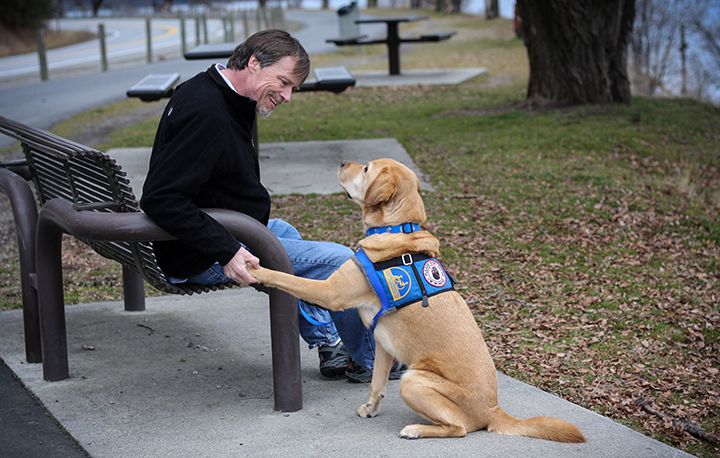
In October 2007, Bob learned why he had been struggling with reasoning, concentration, fatigue and uncontrollable muscle movements. He was diagnosed with Huntington’s disease, a progressive disorder of the brain that inhibits patients physically, emotionally and socially.
Because of his disease, Bob learned he could no longer drive, work or participate in the activities he did growing up in Colorado and Idaho. He was relegated to the sidelines watching his three sons do the things he loved to share with them, like downhill skiing and water sports.
A neurologist mentioned to Bob’s wife, Nila, that an assistance dog could help ease the physical and emotional pain of Bob’s illness. And in 2010, Canine Companions for Independence made it possible for Bob to graduate with assistance dog Exeter, free of charge.
Exeter is always there for Bob as his disease progresses; picking up the many things that Bob drops, turning out the lights or helping Bob get a soda from the fridge.
Donations from people like you helped make it possible for Canine Companions to give Exeter to Bob free of charge.
Bob’s disability often goes unseen or is misinterpreted. “Huntington’s disease robs a person of their motor control and behavioral capabilities,” says Nila. “Often, people would see Bob stumbling and assume he was intoxicated. They didn’t understand that he was only under the influence of Huntington’s.”
After being matched with Exeter, that story has changed dramatically. “People see Exeter in his blue Canine Companions vest and instantly understand that Bob has a disability. Now instead of confronting him, they offer their assistance.”
While Huntington’s disease can cause a loss of interest in many activities, Exeter has captured Bob’s heart. They spend hours together snuggling while Bob holds Exeter’s paws. The physical and emotional benefits Exeter has provided Bob has even slowed the progression of Huntington’s disease.
“Stress hastens the progression of Huntington’s disease, but knowing that Exeter will get the phone if Bob falls and letting the public know that he has a disability has reduced stress for Bob,” states Nila. “Both the doctors and I can agree that Bob is doing as well as he is because of the presence of Exeter in his life.”
